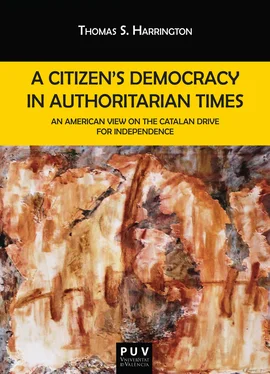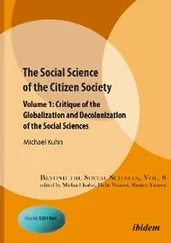The “solution” to this dilemma proposed by Piqué, San Gil and the Aznar government is basically to say that “enough is enough,” that is, that there was no further need for devolution of powers from the center to the periphery. But rather than propose a change in the Constitution aimed at rigorously and straightforwardly codifying the current level of decentralization, they sought instead to establish the essential inviolability of that purposely vague 1978 text, and in so doing, to suddenly reverse their party’s own tradition of open scorn for many of its decentralizing provisions. They sought to justify this abrupt about-face by invoking Habermas’ progressive ideas on reconciling voluntaristic and organicist notions of identity within a single polity.
What they failed to talk about, however, was the intense campaign that the same Partido Popular had waged to re-deploy the historically-charged signs and symbols of Castilian cultural hegemony since coming to office in 1996, and with more intensity still, since achieving an absolute parliamentary majority in May of 2000. Perhaps more importantly, they blithely ignored the fact that Habermas’ idea of constitutional citizenship presumes, indeed, absolutely depends upon, a pitiless examination of the past, especially of the abuses committed in the name of nationalisms constructed on the basis of a shared linguistic, ethnic or racial traits. There is no acknowledgement anywhere in the PP proposals on Spain’s future shape concerning the Castilian center’s fairly constant, albeit always unsuccessful, attempts to cripple and/or eradicate the “other” linguistic cultures of the state during the past. Indeed, there are few lexical resources even available for articulating such a point of view. [4]
I believe that an awareness of this “silence” maintained by the Madrid-centered establishment is one of the keys to furthering overall understanding of the complex and highly problematic interactions between movements of national identity in Spain not only today, but during the entire contemporary era. In the pages that follow, I hope to show that each of the four primary movements of national identity within the Spanish state (Castilian, Basque, Galician and Catalan) have been deeply and fundamentally imbued with the logic of historicist essentialism. In the so-called ‘peripheral’ nations of the state, this fact may have been strategically obscured from time to time, but never widely denied. Within the Castilianist discourse of identity, however, a similarly frank appraisal of this reality has never truly emerged. This ongoing denial, which has been frequently camouflaged by the language of state prerogative and the type of pseudo-progressivism recently invoked by the Aznar government, has served to virtually guarantee that brinksmanship rather than reasoned negotiation be the leitmotiv of Spain’s ongoing search for more cohesive, representative (and hence enduring) social and political institutions.
When we speak of national identity issues, there is a tendency among many observers to fixate primarily on juridical questions such as those that I have briefly touched on above. However, if there is one thing that has become increasingly clear over the last two decades of study into the genesis and evolution of nationality issues, [5]it is that such political constructs, and the debates that attend to them, are located, more often than not, on the trailing edge of social change. The leading edge of that process is what Even-Zohar has termed “culture planning.” For the Israeli theorist, culture planning is “regular activity in the history of collective entities of any size, be they ‘family’, ‘clan’, ‘tribe’, ‘community’, or ‘nation’ “ (“Culture Planning” s.n.) whose principle goal is the creation of a repertoire of options aimed at channeling the human energies of the collective toward a sense of both internal cohesion and differentiation from other such groups.
What is generally meant by ‘cohesion’ is a state where a widely spread sense of solidarity, or togetherness, exists among a group of people, which consequently does not require acts enforced by sheer physical power. The basic, key concept to such cohesion is readiness, or proneness. Readiness (proneness) is a mental disposition which propels people to act in many ways which otherwise may be contrary to their ‘natural inclinations’. For example, going to war ready to be killed in fighting against some other group would be the ultimate case, amply repeated throughout human history. To create a large network of readiness (proneness) on a fair number of issues is something that, although vital for any society, cannot be taken for granted by that society. (“Culture Repertoire,” 395-96)
A key presumption here is that the aforementioned types of communities are not, and should not be characterized as, “natural” or “spontaneously created” entities. Rather they are the end result of a process of conscious organization marked by both “native invention” and the strategically motivated importation of tropes, texts, ideas, and cultural models from non-native cultural systems. Another is that the literate, or perhaps more accurately today, “semiotically savvy” élites, working in variously explicit degrees of complicity with the collective’s (or would-be collective’s) economic and political power brokers, play a preponderantly important role in these efforts. [6]Such an approach obviously dispenses with the largely romantic—but still widely propagated—construct of the individually powerful cultural producer and focuses instead on the broader issue of how his or her “inspiration” is stimulated and/or mediated by a carefully created and vigorously maintained set of institutional structures.
For Even-Zohar, late medieval Spain is the locus of a key quantitative transformation in the history of such activities. It was there that proponents of culture planning, whose history he considers to be coterminous with the trajectory of organized societies dating back to Sumer and perhaps beyond, first successfully imparted “socio-cultural cohesion to a large population which had long been divided” (“The Role,” 26). In other words, the Castilian monarchy led the world in taking techniques of strategic textual manipulation beyond a limited circle of adepts to a plurality of a much larger and broader scheme of social organization. This proselytizing ambition is perhaps most succinctly adduced in Nebrija’s Prólogo a la Gramática de la lengua castellana (1492). The grammarian makes absolutely clear that he sees standardized Castilian writing as an absolutely indispensable—if not the indispensable—pre-condition for the execution of an extremely wide-ranging Castilian political project. In this way, he added the “nation” to the list of entities that could be fortified by a well-run campaign of culture-planning.
However, it should be pointed out that the concept of the “nation” in Nebrija was not the neatly parsed and heavily glossed construct of today’s political theorists and philosophers. Rather, throughout his short but remarkable treatise on culture-planning, he regularly conflates his concept of the Castilian “nation” with that of the Castilian “empire.” Thus, to be a possessor of Castilian was for him not simply to be different from, but also superior to, the “other,” a category which not only included “los enemigos de nuestra fe” but also “los vizcainos, navarros, franceses, italianos, y todos los otros que tienen algún trato y conversación en España” (Nebrija s.n.) Indeed, he sees the linguistic subjugation of the other Christian peoples of peninsula as the crowning element in a centuries-long campaign for peace:
(Castilian) tuvo su niñez en el tiempo de los juezes y Reies de Castilla y de León, y començó a mostrar sus fuerças en tiempo del mui esclarecido y digno de toda la eternidad el Rei don Alonso el Sabio, por cuio mandado se escrivieron las Siete Partidas, la General Istoria, y fueron trasladados muchos libros de latin y aravigo en nuestra lengua castellana. La cual se estendió después hasta Aragón y Navarra y de allí a Italia, siguiendo la compañía de los infantes que embiamos a imperar en aquellos Reinos. I assí creció hasta la monarchía y paz de que gozamos, primera mente por la bondad y providencia divina; después por la industria, trabajo y diligencia de vuestra real majestad. En la fortuna y buena dicha de la cual, los miembros y pedaços de España, que estavan por muchas partes derramados, se reduxeron y aiuntaron en un cuerpo y unidad de Reino. (Nebrija s.n.)
Читать дальше












